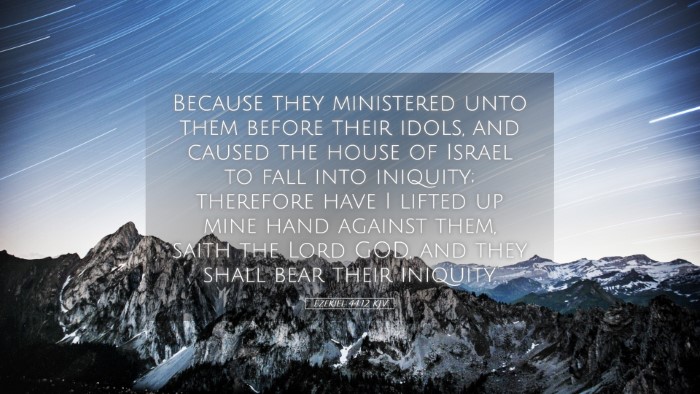Ezekiel 44:12 - Commentary Summary
Ezekiel 44:12 states: "Because they ministered unto them before their idols and caused the house of Israel to fall into iniquity, therefore have I lifted up mine hand against them, saith the Lord God, and they shall bear their iniquity."
Introduction
This verse occurs within the context of a detailed discourse regarding the future temple and the priests who are permitted to minister therein. Ezekiel prophesies a purification of the priesthood and an emphasis on holiness, as well as the distinctive role of the Levites. This commentary draws insights from notable biblicists such as Matthew Henry, Albert Barnes, and Adam Clarke to unpack the theological implications and the cultural significance of this declaration.
The Failure of the Priests
The initial focus of Ezekiel 44:12 is on the failure of the priests who are referenced as those who caused the house of Israel to fall into iniquity. Here, it is crucial to note the reason for God's judgment—their role in leading the people astray through idolatrous practices.
- Matthew Henry emphasizes that the priests, who should have guided the people in righteousness, instead became instruments of rebellion against God. Their lapse into idolatry not only defiled the temple but also led the nation into moral decay.
- Albert Barnes highlights that these priests were disqualified from serving in the new ministry due to their previous misconduct, indicating that the consequences of their actions were far-reaching and severe.
- Adam Clarke interprets the significance of “ministering unto idols” as a profound betrayal of their holy calling, showing a clear deviation from their divinely appointed task.
God's Judgment
God's declaration of judgment is central to understanding this verse. The statement "I have lifted up mine hand against them" signifies a solemn and serious act of divine retribution.
- Matthew Henry notes that God’s lifting of His hand symbolizes a withdrawal of His protection and blessing. The priests face the consequences of their actions—thereby serving as a cautionary tale for future leaders.
- Albert Barnes explains that such severe judgment highlights God's commitment to purity within His appointed ministry and ensures that the temple remains a sanctified place. This reflects the broader theme of divine justice throughout Scripture.
- Adam Clarke adds that God's actions underscore His holiness, affirming that iniquity cannot be overlooked, even among those designated as spiritual leaders.
Theological Implications
The passage holds deep theological implications regarding leadership, accountability, and the nature of worship.
- Spiritual Leadership: The failure of the priests serves as an admonition regarding the importance of integrity and fidelity in spiritual leadership. Leaders are held to a higher standard as they guide others in their faith.
- Worship and Idolatry: The reference to idolatry speaks to the broader biblical theme of being distanced from God through unfaithfulness. Any deviation from true worship can lead to moral and communal collapse.
- Divine Justice: God's response to human failure is consistent throughout Scripture; a reminder that His justice prevails and that divine mercy must not be taken for granted, particularly by those in positions of spiritual authority.
Application for Today
This verse resonates with contemporary readers, especially pastors, students, and theologians, by challenging them to evaluate their lives and ministries in light of God’s standards.
- Self-Examination: Just as the priests were called to account for their actions, modern leaders must engage in continuous self-examination and repentance to ensure alignment with God’s will.
- Faithfulness in Ministry: The necessity of maintaining fidelity to God’s commands is critical for anyone in leadership. Teaching and leading must be grounded in Scripture, steering clear of cultural distractions that may lead to idolatry.
- Community Impact: Leaders in faith communities must be wise and discerning, recognizing their influence over congregants and the potential for both good and harm depending on their adherence to holiness.
Conclusion
The warning encapsulated in Ezekiel 44:12 serves not just as a historical record, but as a timeless lesson about the weight of responsibility borne by spiritual leaders. The necessity for purity in worship and fidelity to God remains relevant as communities seek to uphold the sanctity of their faith in an increasingly idolatrous world.


